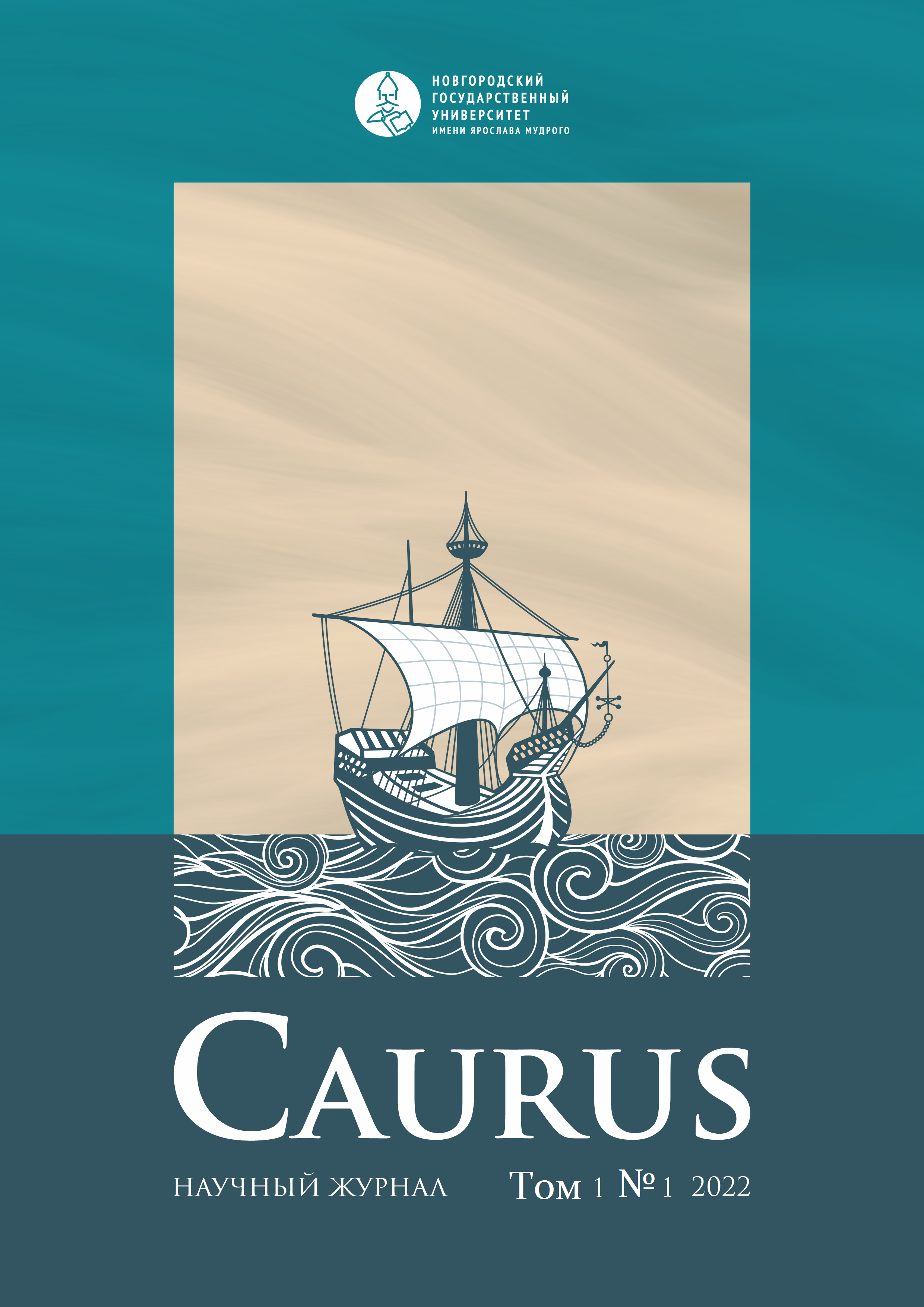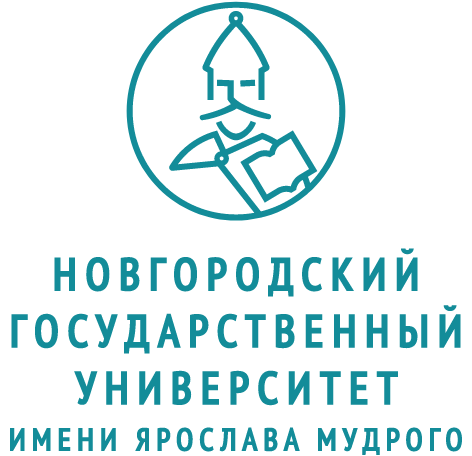Предисловие главного редактора
Аннотация
Уважаемые читатели, дорогие коллеги!
Вашему вниманию предлагается первый номер нового периодического издания Новгородского государственного университета им. Ярослава Мудрого. Научный журнал "Caurus" был учрежден приказом и. о. ректора профессора Ю. С. Боровикова № 2443 от 13 декабря 2021 года в рамках реализации плана развития НовГУ, включающего публикацию научных периодических изданий мирового уровня, формирование площадок научно-образовательной кооперации, усиление и оптимизацию публикационной активности профессорско-преподавательского состава НовГУ.
Новый журнал, первый номер которого выйдет в начале осени 2022 года, получил название «Caurus», что в переводе с латыни означает «Северо-западный ветер». Члены издательского коллектива отдали предпочтение этому наименованию, полагая, что оно в наибольшей мере отражает географическую привязку и тематические аспекты предназначенных к публикации материалов, которые будут представлять достижения отечественных и зарубежных исследователей в области изучения исторического прошлого русского Северо-Запада и государств Балтийского региона. Хронологические рамки публикаций предполагается ограничивать тысячелетним периодом «доиндустриальной эпохи» VIII – XVIII веков, когда формировались предпосылки и закладывался фундамент многофункциональной модели современных российско-западноевропейских взаимоотношений, которые и тогда отличались сложным набором атрибутов, порождавших крайне неоднозначные интерпретации.
В основу концепции данного журнала заложено представление о Балтийском регионе как о коммуникативной зоне, на протяжении многих столетий имевшей исключительно важное значение для формирования не только локального, но и всего европейского культурно-исторического пространства. Научное осмысление этого процесса часто подменяется политической мифологией, порождаемой стереотипами общественного сознания и продуцирующей их в еще больших объемах. Дискурсивность данной проблематики, равно как и многообразие авторских интенций и интерпретаций, предполагает скрупулезную исследовательскую работу и обретение нового знания в режиме наибольшей объективности. Последнее вряд ли возможно вне воссоздания масштабной панорамы международных балтийских контактов – экономических, политико-правовых, институционных, социокультурных, интеллектуальных и пр., благодаря которым в пределах означенного пространства был запущен и в различных контекстах времени весьма продуктивно функционировал механизм соадаптации русского или православного и западного или католического, а с XVI века еще и протестантского «миров».
В соответствии с профилем презентуемого издания наполнение издательского «портфеля» будет осуществляться, главным образом, за счет исследований, касающихся взаимоотношений русского Северо-Запада, его городов – Великого Новгорода, Пскова, Полоцка, а также государственных образований, со странами Балтии, главным образом, с Ливонией, которая располагалась на территории современных Эстонии и Латвии и являлась важным посредником в осуществлении контактов Руси/России с Западной Европой.
В фокусе особого внимания редакции журнала будут находиться история Ганзы и русско-ганзейских контактов, типологические особенности духовно-рыцарских орденов и «орденских государств» (Ordensstaaten) Прибалтики (государства ливонского подразделения Тевтонского ордена и Орденской Пруссии); пограничные инциденты времен переделов «обидных» рубежей; перипетии межгосударственных конфликтов в условиях «битвы за Балтику» (dominium maris Baltici) и методы их урегулирования; дипломатия и договорная практика, заложившие основу международного права.
Обращаясь к историческому прошлому государств Балтийского региона, нельзя пройти мимо разнообразия их административно-правовых и институциональных моделей, которые следует соотнести с русскими вариантами. Кроме того, внимание издателей журнала будет сфокусировано на исследованиях «персональной истории» (просопографии), проблемных моментов материальной истории и социокультурных традиций, интеллектуальной истории, касающающейся взаимодействия русского/российского и западноевропейского обществ в сфере образования и культуры. Дополнением ко всему вышеперечисленному явятся исследования историографического и источниковедческого характера, данных современной археологии, нумизматики и сфрагистики.
Основная часть журнала «Caurus» отведена публикациям научных статей индивидуального или коллективного авторства на русском, английском и немецком языках с аннотациями на русском и английском языках, что обеспечит журналу возможность расширения международного сотрудничества и презентации достижений современной историографии в разработке «балтийской» тематики. При отборе материалов редколлегией в качестве основных критериев заявлены научная новизна исследования, актуальность затронутых тем и проблематики, оригинальность исследовательских методик и введение в научный оборот новых источников. Все материалы в журнале печатаются впервые; повторное издание ранее публиковавшихся текстов как целиком, так и в виде фрагментов, не допустимо. Все статьи будут проходить процедуру двойного анонимного рецензирования, которое осуществляется членами редакционного совета и редакционной коллегии журнала, а также приглашенными российскими и зарубежными специалистами. Особо приветствуются исследования, выполненные на основе архивных материалов или оригинальных трактовок известных источников с презентациями оригинальных методик и концепций.
Степень успешности конструирования образа прошлого в немалой степени зависит от динамики расширения источниковой базы исторических исследований, и потому журнал «Caurus» в целях оптимизации изучения «балтийского вопроса» на современном этапе с большой охотой предоставит свои страницы для публикации документальных памятников и результатов их исследований в специально созданной рубрике. Документы из зарубежных архивов, которые в нашей стране, как правило, недостаточно известны, планируется издавать там в режиме bilingua, т. е. на языке оригинала и в переводе на русский язык, что призвано содействовать корректировке транскрибированных текстов и улучшению переводов. Все публикации источников будут сопровождаться краткими источниковедческими очерками, которые позволят ближе познакомиться с источниками и их основными характеристиками, в сопровождении справочного материала, размещенного в подстрочных ссылках и/или в особых приложениях.
Особая рубрика журнала будет посвящена хронике событий, имеющих отношение к тематической и концептуальной направленности журнала – конференциям, круглым столам, образовательным и культурным мероприятиям, профильным сайтам и web-ресурсам. В том же разделе планируется публиковать информацию о соответствующих мероприятиях департамента международного сотрудничества НовГУ, кафедры всемирной истории и международных отношений (КВИМО) и Центра сотрудничества со странами Северной Европы и Балтии (Балтийского центра).
Помимо этого, в журнале можно будет найти рецензии на наиболее интересные современные исследования, включая зарубежные, и ежегодные библиографические обзоры.
Редакция журнала обеспечивает его выход два раза в год и предоставляет читателям бесплатный доступ к полным текстам всех статей на официальном сайте издания (https://journal-caurus.ru).
М. Б. Бессуднова







